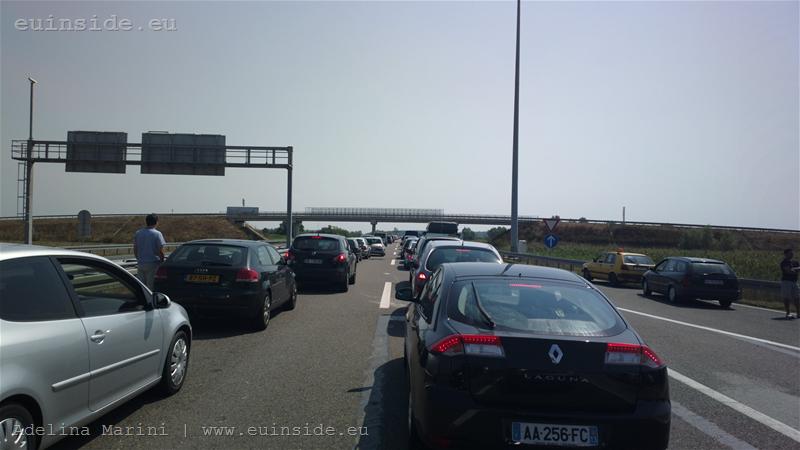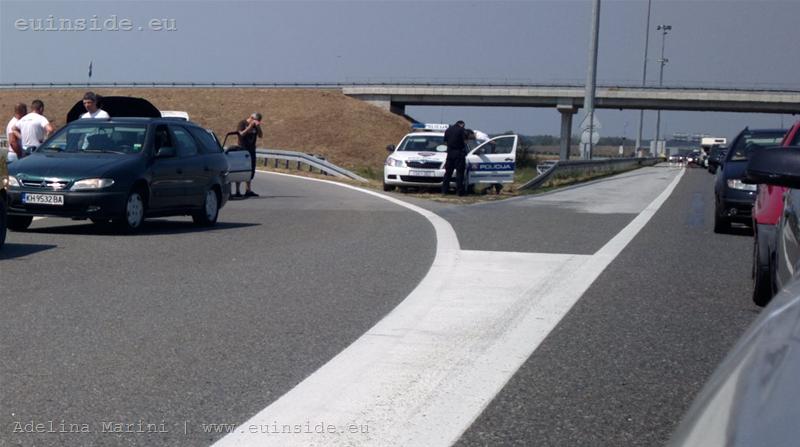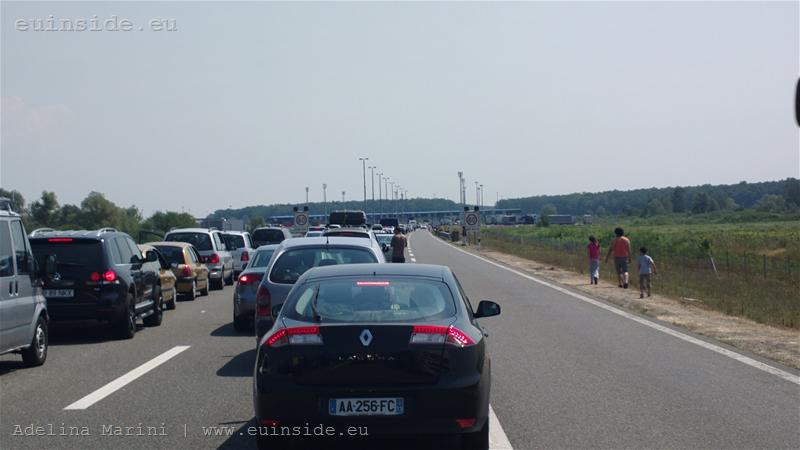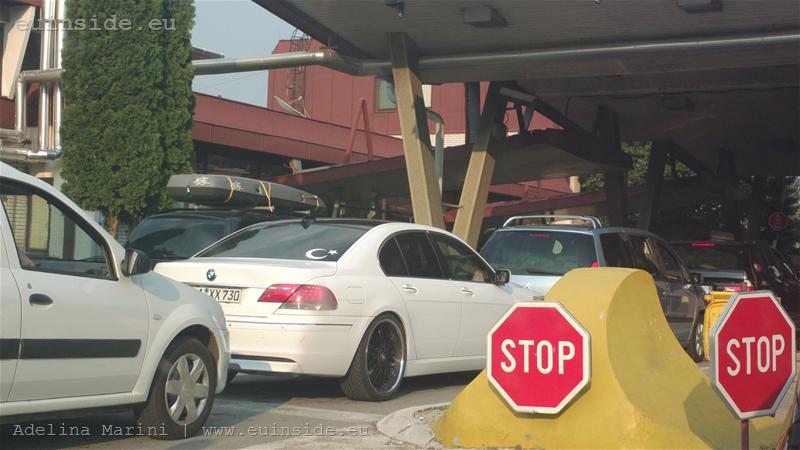The Season of Multiculti
Adelina Marini, August 7, 2012
 Summer is the time when European roads, especially along the axis Western Europe-Turkey get overloaded by impressive traffic. August, however, is the peak, when the flow of going home to Turkey European citizens thickens and this quite often is a reason for increased tensions. This is precisely when it is visible if countries are capable of bringing order. Although I know well that August is not the time when I should wander around in Europe by car, I had to go back to Sofia last weekend. I left Zagreb early in the morning, hoping to arrive in Sofia around 5 in the afternoon but my plans failed completely because of the kilometres-long queue at the border between Croatia and Serbia. I cannot tell you exactly how long the queue was but my stay there lasted approximately 2 hours in an unbearable heat.
Summer is the time when European roads, especially along the axis Western Europe-Turkey get overloaded by impressive traffic. August, however, is the peak, when the flow of going home to Turkey European citizens thickens and this quite often is a reason for increased tensions. This is precisely when it is visible if countries are capable of bringing order. Although I know well that August is not the time when I should wander around in Europe by car, I had to go back to Sofia last weekend. I left Zagreb early in the morning, hoping to arrive in Sofia around 5 in the afternoon but my plans failed completely because of the kilometres-long queue at the border between Croatia and Serbia. I cannot tell you exactly how long the queue was but my stay there lasted approximately 2 hours in an unbearable heat.

The rows of cars with various license plates - German, Dutch, French, English, Serbian, Bulgarian - were moving slowly along the two lanes of the motorway. The emergency lane has to stay empty, although this is not what mainly Bulgarian and Serbian drivers were thinking, who, according to a good and never sanctioned tradition, decided they were smarter than everybody else and drove their way before the rest. Yes but no. The Croatian police again proved in practise what rule of law actually means. At every kilometre there was a police car which interrupted everyone who dared to drive along the emergency lane. Separately from them, there were patrolling police cars who made sure there was order in the queues.

During my two-hour long stay until we passed the border, at least ten cars, mainly with Bulgarian and Serbian license plates, were stopped by the police and probably fined as their subsequent behaviour showed. This is not the first time when the Croatian authorities react, as it is modern nowadays to say, "pro-actively" at a situation, knowing that their touristic season enters its peak and all their border crossings would be exceedingly overloaded by the flow of tourists and also by the gastarbeiters going home for the summer holidays. There were no "people in a hurry" to remain unpunished and I cannot describe to you the satisfaction that brought to me but not a malicious joy. No. It was more the feeling of justice that law is for all.
As a person who is deeply convinced that the organisation of road traffic is the main proof of whether a country has a rule of law or not, I always suffer in Bulgaria when driving because there are always people with more rights than you (be it an expensive car, or flashing headlights, or a simple arrogance), for whom rules never existed when they want to pass quickly or before anyone else. Police never managed to tackle this problem, if it ever attempted, because it is easier to take a bribe, leaving a bitter taste in those who want the law to be for everyone. When that is a fact, then pressure drops sharply and one can think not of their driving but of their own stuff.

And before I am attacked by all elementary-patriotically-inclined people, I have to say that I had the first positive emotions in my entire life of frequently travelling by car person throughout Europe from my entry into Bulgaria. I have never so far felt "protected". In most cases, my going home is related to always stern-faced border police officers and their regular and hyper irritating me question "do you have cigarettes or something?". I will not comment on the question, it might be reasonable, but it seems to me highly unprofessional. This time, though, it was different. The thick gastarbeiter traffic was of particular concern for me, as I was wondering whether I'd spend another few hours at the Serbian-Bulgarian border.
The big surprise came when I noticed that, first, all the desks worked and, second, there were police shuttling along the rows of cars and rearranging them. Honestly, I could not understand in what principle they were rearranging the cars, but after we responded affirmative to the question "are you with Bulgarian IDs?", we were asked to move to the rightest row. There were quite a lot of cars with Western European license plates, the passengers, however, looked visibly different from the main flow of gastarbeiters. Another thing that evoked very good impressions in me, was that towards our "selected" row there were attempts from the neighbouring ones by "Europeans", who begged to pass before us. Some helpful Bulgarians let them in, as they often do at Sofia junctures, allowing people who "hurry more than the others" to go through first in the most overloaded lanes. But then the border police interfered, restoring order.
Apart from the fact that we passed very quickly (for no more than 15 minutes), but on top of it a young and smiling female official wished us "welcome", with which she made us again wonder whether we were dreaming. It is unlikely the news from last week that Germany is now official in its reluctance to allow Bulgaria and Romania to join Schengen to be the reason for this behaviour. More likely it is the fact that the Bulgarian border authorities are aware of the August multiculti traffic and interfere actively in managing it, which is still surprising.
Rule of law is something as simple, so very complex. Complex because the desire for it must come from inside. In Bulgaria, for instance, people in large numbers benefit from its lack because this makes them feel special when they pass wherever thanks to well-connectedness. Probably this is the result of the decades long smashing impact of the totalitarian machine, for which it doesn't matter what your personal qualities or achievements are - what matters is who you are close to. May be, decades will pass until people in Bulgaria realise the syndrome of the left lane, as we call it in our family - the fastest lane, where usually everyone wants to be in, making it the slowest moving lane. Then they will start needing to be equal both in rights and in obligations.
Bulgaria is a member of the EU since 2007 when it has been accepted with a mechanism, the purpose of which is to help the country create rule of law. Alas, the mechanism has been functioning for 5 years now and the battle might not have been lost but it is not won either. Croatia signed its accession treaty in December and is expected to become a full fledged member of the EU on 1st of July 2013, if, of course, the process of ratification goes on well, in spite of some unresolved problems, of which I will be informing you in the upcoming months. But the traffic is excellent, which makes driving around the country and its cities and towns very calm and not irritable, although in the summer time the number of automobiles jumps with times.
Serbia, after a lot of pain, finally received a candidate status but when will the country start accession negotiations is a question which no one dares to answer. By the way, if you've noticed, I failed to mention something about Serbia's border authorities. This is so because there is nothing to mention. They worked as usual, as it is with the normal traffic. There was no special organisation, except may be that almost all desks worked. But Serbia's road to European membership, therefore towards rule of law (hopefully), is yet to start and this time, having the experience with Bulgaria and Romania, probably the EU will do what's necessary to ensure that. If we judge by the traffic in Serbia, this will be a very difficult task.

The season of multiculti is a tough test for everyone because this is the time when at the lowest, everyday level, precisely where the so gently called by politicians "ordinary citizens" are, tension appears from the clash of various cultures, perceptions of the world, discipline and extent of obedience to law. Where it doesn't matter where are you born or which country your passport is from. What matters is another favourite to European officials and politicians thing - "European values". This is when one can fully comprehend what European values mean. They cannot be described, they can be experienced. Especially in August, when experience is strong and real.